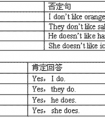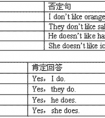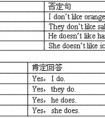根据所给图片,补充句子。1. Thesignsays, " ."2. Mysister everyday.3. Heverymuch.4. LiMing yesterdayevening.5. Theyarein . -六年级英语
flies
tries
一般现在时的特殊用法:
一些动词可用一般现在时来表达现在进行时:
verbs of the senses: hear,see,taste,smell,feel
verbs of the thinking: believe,know,mean,realize,think,remember
verbs of the linking: dislike,fear,heat,like,love,want
verbs of the possession: belong,have,own,possess
考点名称:一般过去时,动词过去式
一般过去时:
表示过去某个时间里发生的动作或状态;过去习惯性、经常性的动作、行为;过去主语所具备的能力和性格。
be动词在第一人称是单数和第三人称是单数是用was,其余用were。
a. 表示在过去时间里所发生的动作或存在的状态,常与表示过去的时间状语。
yesterday(昨天)、last week (上星期)、an hour ago(一小时前)等连用。
例:I went to the zoo with my father last Sunday. 上周日我和我爸爸去动物园了。
They weren't able to come because they were so busy.他太忙了,所以去不了。
b. 表示在过去一段时间里,经常性或习惯性的动作或状态。
例:My brother watched the World Cup every day last month.上个月哥哥每天都看世界杯比赛。- 一般过去时句法结构:
肯定形式
主语+动词过去式+其他
例句:She often came to help us in those days.
否定形式
①was/were+not;②在行为动词前加didn't,同时还原行为动词
例句:I didn't know you like coffee
一般疑问句
①Did+主语+do+其他? ②Was\Were+主语+表语?
例句:Did I do that?
用表格整理如下:肯定式 疑问式 否定式 疑问否定式 Iworked Did I work? I did not work Did I not work? He(She,It) worked Did he(she,it) work? He(she,it) did not work Did he(she,it) notwork? We worked Did we work? We did not work Did we not work? You worked Did you work? You did not work Did you not work? They worked Did they work? They did not work Did they not work?
结构句型:
1.一般句子
I watched TV last night.
2.一般疑问句
Did you watch TV last night?
3.there be 句型
There was an apple on the table last night.
Was there an apple on the table last night - 一般过去时用法口诀:
一般过去时并不难,过去动作、状态记心间。
动词要用过去式,时间状语句末站。
否定句很简单,didn't 站在动原前,其它部分不要变。
一般疑问句也好变,did放在句子前,主语、动原、其它部分依次站。
特殊疑问句也简单,疑问词加一般疑问句记心间。
最后一条请注意,动词过去式要牢记! - 过去式和过去分词的构成表:
不规则变化的动词过去式:词
构成
举例
一般情况
词尾+ed
动词原形
过去式和过去分词
look
talklooked
talked以不发音字母e结尾
词尾+d
like
arriveliked
arrived以“辅以字母+y”结尾
变y为i,再加ed
fly
studyflied
studied以重读闭音节结尾,且末尾只有一个辅音字母
双写词尾+ed
stop
planstopped
planned
have---had are---were get---got say---said feel---felt do/does---did is---was go---went drink--drank eat--ate bring----brought think----thought
buy----bought catch---- caught teach ---- taught sit----sat wear----wore cut----cut sweep----swept sleep——slept become----became
考点名称:一般将来时
一般将来时:
表示将来某个时间要发生的动作或存在的状态,也表示将来经常或反复发生的动作。
由“助动词will+动词原形”构成。“be going to+动词原形”结构是将来时的另一种形式,表示将要发生的事或者事先经过考虑打算去做某事。
例:We will go to Shanghai next year. 明年我们要去上海。
We are going to have a football match tomorrow. 我们明天要举行一场足球比赛。
Tom is going to have a bath. 汤姆要去洗澡了。一般将来时常见结构:
1、will / shall + 动词原形(否定句在will/shall后加not)
will 常简略为 'll,并与主语连写在一起,如: I'll,she'll,he'll,it'll,we'll,you'll,they'll。
一般疑问句如用will you…?其简略答语须是Yes,I will或 No,I won't;如用 Shall I…?(较少见)其简略答语须是 Yes,I shall.或 No, I shall not.
这种方法一般单纯地表示将来某个时间将要发生的动作或存在的状态。will用于各种人称;shall只用于第一人称。 例如 :
I will / shall go to visit him next week. 下周我将去拜访他。
What time shall we go there tomorrow? 明天我们几点去那儿?
2、be going to 动词原形
be going to 相当于一个助动词(其中be有人称和数的变化),与它后面的动词原形一起构成谓语。用来表示近期将要发生的动作以及计划、安排和打算要做的事。例如:
There is going to be a football match this afternoon.今天下午将有一场足球赛。
I‘m going to go to the park. 我将要去公园。
常用结构:
1、用于"I expect, I'm sure, I think, I wonder宾语从句"中。
Don't worry about the exam. I'm sure you'll pass.
不要担心这次考试,我确信你会通过的。
2、用于祈使句和陈述句中。
Work hard and you will succeed.
如果你努力,就会成功的。
3、与表示时间或条件的状语从句连用。
I'll let you know as soon as he arrives.
他一到我就通知你。- be going to与will的区别:
be going to与will两者都可表示将要发生的事、将要去做某事,但它们有如下几点区别:
1. be going to 表示近期、将要发生的事情,will 表示的将来的时间则较远一些,如:
He is going to write a letter tonight.
He will write a book one day.
2. be going to 表示根据主观判断将来肯定发生的事情,will表示客观上将来势必发生的事情。
He is seriously ill. He is going to die.
He will be twenty years old.
3. be going to 含有“计划,准备”的意思,而 will 则没有这个意思,如:
She is going to lend us her book.
He will be here in half an hour.
4.在有条件从句的主句中,一般不用 be going to, 而多用will, 如:
If any beasts comes at you, I'll stay with you and help you
注意
be going to和will在含义和用法上稍有不同。be going to往往表示事先经过考虑的打算;will多表示意愿,决心。两者有时不能互换。如:
She is studying hard and is going to try for the exams.她正努力学习并尝试参加考试。(is going to不能用will替换)
- 最新内容
- 相关内容
- 网友推荐
- 图文推荐
| [家长教育] 孩子为什么会和父母感情疏离? (2019-07-14) |
| [教师分享] 给远方姐姐的一封信 (2018-11-07) |
| [教师分享] 伸缩门 (2018-11-07) |
| [教师分享] 回家乡 (2018-11-07) |
| [教师分享] 是风味也是人间 (2018-11-07) |
| [教师分享] 一句格言的启示 (2018-11-07) |
| [教师分享] 无规矩不成方圆 (2018-11-07) |
| [教师分享] 第十届全国教育名家论坛有感(二) (2018-11-07) |
| [教师分享] 贪玩的小狗 (2018-11-07) |
| [教师分享] 未命名文章 (2018-11-07) |



![Let's ____________ somefun.[ ]A.haveB.hasC.had-五年级英语](http://www.00-edu.com/d/file/ks/4/1/67/2019-09-01/smallee0c5b0456fd527ff36ce160b4dfe7ad1567348511.gif)

![Whatdoesthesignmean?(这标志是什么意思) [ ]A.Turnright!B.Don'tturnrightC.Turnleft!-六年级英语](http://www.00-edu.com/d/file/ks/4/1/67/2019-09-01/small641a4bfa9c93e8269087b9baa4d8d4411567348144.gif)
